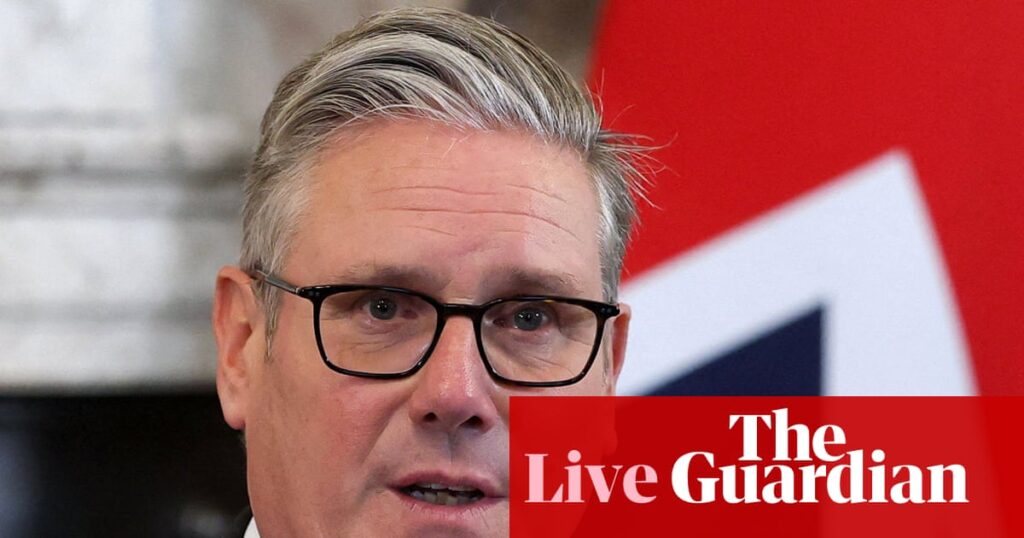Key events
What does recognition of Palestinian statehood entail practically?
The Guardian’s diplomatic editor, Patrick Wintour, has done a useful explainer with a section looking at what recognising Palestine would look like in practice. Here is an extract:
Recognition is largely symbolic. When the UK’s position was announced the then foreign secretary, David Lammy, said: “It will not change the position on the ground.”
But it allows the UK to enter treaties with Palestine and would mean that the Palestine head of mission becomes a fully recognised ambassador.
Some argue that a greater onus would be placed on the UK to boycott goods imported into the UK by Israel that come from the occupied territories.
But it is seen more as a statement on Palestine’s future, and disapproval of Israel’s refusal to negotiate a Palestinian state…
There are genuine fears that Israel is about to annex the West Bank or make Gaza so uninhabitable that Palestinians are forced over the borders into Jordan or Egypt, so destroying the possibility of a Palestinian homeland.
Recognition that Palestine is a state with the right to self-determination is an attempt to show Israel cannot simply annex land that the international court of justice has declared to be illegally occupied.
Keir Starmer set to announce UK recognition of Palestinian state later today
Good morning and welcome to our live coverage of UK politics.
The British prime minister, Keir Starmer, is expected to announce the UK’s recognition of a Palestinian state in a statement on Sunday afternoon, despite fierce Israeli opposition and US pressure to reconsider.
Starmer said in July he would recognise Palestinian statehood before the UN general assembly in New York this month if Israel did not meet a series of conditions to improve the humanitarian situation in Gaza, including agreeing to a ceasefire and committing to a long-term peace process leading to a Palestinian state coexisting alongside Israel.
But Israel’s continued restrictions on aid into the devastated territory, causing starvation in parts of the Strip, the IDF’s relentless bombardments, killing a high number of civilians and destroying much of Gaza’s infrastructure, and Israel’s expanded assault on famine-stricken Gaza City, which has forced hundreds of thousands of people to flee, has made the government feel like taking stronger action – no matter how symbolic – is necessary.
The UK government is also said to be alarmed at plans to accelerate Israeli settlements in the West Bank which ministers fear will end any hope of a two-state solution.
High-level meetings at the UN summit involving world leaders begin on 23 September. In a rare diplomatic break with Washington, Starmer has found himself at odds with the Trump administration over the move, which is opposed to giving official recognition to the state.
Portugal’s foreign ministry said on Friday that it would also formally declare its recognition for Palestinian statehood on Sunday.
Lisbon had already announced in July that it intended to do so, citing the “extremely worrying evolution of the conflict”. Similar moves have been made by Australia, Canada, Luxembourg and France. The Israeli government says that recognition rewards Hamas’ terrorism.
Labour has sought to stress that recognition of a Palestinian state is not a reward for Hamas, and emphasised that it would have no role in the future governance of Gaza.
It is expected the government will ratchet up sanctions on Hamas in due course, and it has stepped up demands for the release of hostages.
Family members of some of the hostages taken by Hamas during its attack on southern Israel in October 2023, in which about 1,200 people were killed and 251 taken hostage, urged Starmer to hold off from recognition until the 48 still in Gaza, of whom 20 are believed to still be alive, had been returned safely.
The letter said:
Your regrettable announcement of the UK’s intention to recognise a Palestinian state at the United Nations general assembly has dramatically complicated efforts to bring home our loved ones.
Hamas has already celebrated the UK’s decision as a victory and reneged on a ceasefire deal. We write to you with a simple plea – do not take this step until our loved ones are home and in our arms.

